On 28th May 2023, Carlos Mazón was elected president of the regional government of Valencia as leader of the Partido Popular. On 21st July 2023 he announced that his government had approved the initiation of a bill to reduce succession and gift tax (ISD – Impuesto de sucesiones y donaciones – Inheritance Tax to the UK reader).
The end of succession tax in Valencia
By John Hayward
This article is published on: 6th September 2023

The draft bill was placed on the urgent pile with Les Corts on 3rd August 2023 and it awaits absolute approval.
Mazón’s reasoning was that the income from ISD represents around 1% of the region’s total revenue and that charging tax on money that has been taxed before was not fair. He wants to reduce the tax burden to prevent an inheritance from becoming a “serious economic loss for many families, who have to face its payment, without the inheritance entailing any economic benefit or real increase in their assets.” This seems a very refreshing attitude although his opposition have argued that the wealthy will avoid tax that would generate around €400 million a year. This assumes that the timing of deaths and gifts matches their statistics.

There are conditions to this bonificación in that only close family members and spouses will benefit but that is the same with the existing reduction. The improvement is that, for the majority of spouses and close family members, they will receive a reduction of 99% on the tax bill. Currently it is only 50%.
All this being said, there is still room for inheritance tax, and gift tax, planning. We experience many complicated situations where, for example, couples are not married or there are children from different marriages. Keeping assets away from the inheritance and gift tax net in Spain, in a legal way, is key, especially for beneficiaries who do not live in Spain.
We await absolute approval of the bill but, and although this may sound a little insensitive, any deaths, and gifts made, since 28th May 2023 will be eligible for this new law.
And like buses… Abolition of Wealth Tax in Valencia?
One at a time, please!
More to follow…
To find out how Spanish inheritance and gift tax will affect you and your beneficiaries, as well how we can help you with your existing investments and tax planning, and provide you with ideas for the future, contact me today at john.hayward@spectrum-ifa.com or on +34 618 204 731 (WhatsApp)
Succession planning in Portugal
By Mark Quinn
This article is published on: 22nd July 2022

How to protect your loved ones
Death and taxes are the two certainties, but it is surprising how many of us fail to properly plan during our lifetimes.
The key considerations for most of us in this area of planning are ‘control’ and ‘taxation’. This is ensuring that assets are passed to the right individuals, in the right proportions, at the right time with minimal taxation. But as expats, in order to ensure this happens, you must carefully consider the succession rules of Portugal, your originating country, and any interaction between the two.
Understanding the Portuguese rules
Unlike the UK, where you can generally leave your assets however you wish, Portugal has ‘forced heirship’ rules. These force you to leave certain proportions of your assets to specific family members and applies to your worldwide estate (except for non-Portuguese real estate).
For expats, the ‘Brussels IV’ regulation means that the rules of your country of habitual residence will apply, so forced heirship could apply to you unless you specifically elect for the succession law of your country of nationality to apply via your Will, or other appropriate legal documents. This must be done during your lifetime and cannot be changed after your death. But it is important to note that this does not affect the tax rules that apply, only the rules around succession, and these two issues should be looked at independently.
There is no inheritance tax in Portugal. Instead, Stamp Duty is due at 10% on assets located in Portugal that pass to someone other than a spouse or direct line ascendants or descendants. This tax is paid by the recipient irrespective of where they live and must be paid before receiving the asset. It is due within 6 months of the death, so for large gifts and inheritances, this could be a problem for your loved ones.
Impact of your nationality
A particular issue for British expats is that their liability to UK inheritance tax (IHT) is not determined by where they live (as with Brussels IV), but by their domicile. This means that even if you live in Portugal, and have done so for many years, you can still be subject to UK IHT as well as Portuguese taxes. There are rules in place to avoid double taxation, but again this will have to be sorted out by the recipients and your executors which might be complex and costly.
It is possible to shed your UK domicile however this is very complex, so specific advice should be sought.

Tax mitigation
IHT is sometimes considered a voluntary tax as with the right planning, there are many steps you can take to reduce the tax liability on your estate and gifts. From a Portuguese perspective, this can be as simple as holding your assets outside of Portugal. For UK nationals, the planning is likely to be a little more complex such as utilising all allowances and the gifting rules, trusts or trust-like structures, or domicile changes.
What about Wills?
UK Wills are valid under Portuguese law but practically, it is likely to be more difficult, costly, and time-consuming for your executor or heirs to go through the bureaucracy in Portugal. We suggest that you have a separate Will for each country in which you hold assets. They should acknowledge the other Wills, however, they must not override or conflict with each other.
Even if you already have a plan in place, it is important to review this periodically, or if your family or financial circumstances change.
With careful planning and our specialist cross-border advice, we can help you create the right estate plan for you and your family.
Are you domicile or non-domicile?
By Mark Quinn
This article is published on: 16th June 2022
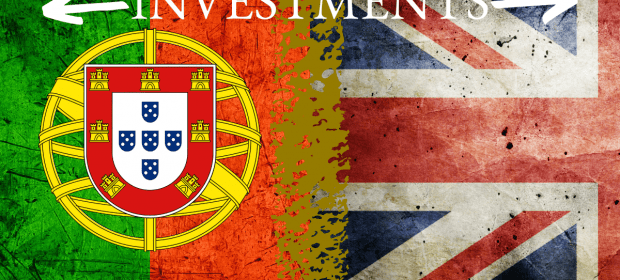
Domicile is often confused with residence, but it is quite distinct
The law of domicile is highly complex and has wide-ranging consequences on an individual’s tax position, as the recent furore surrounding Akshata Murty illustrates, but for most British nationals here in Portugal, domicile is a key factor for UK Inheritance Tax (IHT).
Individuals only have one domicile at a time and a very loose definition is ‘where you have a permanent home’. In my experience, this is often misunderstood and individuals who thought they were ‘definitely non-UK domiciled’ after living in Portugal for several years learn that in fact, they are very much still UK domiciled.
The are several types of domicile, namely ‘Origin’, ‘Choice’, ‘Dependence’ and ‘Deemed’ but here I will focus on the first two. Firstly, ‘Origin’. This is acquired at birth, usually from your father (or your mother if they were not married at the time of your birth). This is never fully lost but can be suspended by acquiring a new domicile of choice, but it is adhesive and will revive if the new domicile is lost.
Acquiring a domicile of choice involves forming a clear and fixed intention for a new country to be your permanent home, and therefore actually requires permanent residence.
Being non-UK domiciled is highly advantageous for UK IHT
The worldwide estates of UK domiciles are assessed for IHT in the UK, even if you live elsewhere. For non-UK domiciles, generally only UK based assets are assessed. It is worth noting here, that assets that derive their value from the UK but are held elsewhere e.g. company shares, will be deemed to be UK assets.

Shedding UK domicile is tricky
The burden of proof lies with the person claiming the change and the standard is particularly onerous. There is no checklist and your circumstances are looked at as a whole. Some factors that might be considered are family and business ties, location of friends and social interests, location of assets, acquisition of citizenship or languages spoken.
The adhesive nature of domicile is highlighted by Richard Burton’s failed attempt to change his domicile, which resulted in an IHT bill of £2.4m. Despite him living in Switzerland for 26 years, structuring his assets appropriately and subsequently dying there, the revenue was successful in arguing that his ‘mind and heart’ still remained in Wales. Their evidence being his choice to have the Welsh flag draped over his coffin and being buried with a book of Dylan Thomas poems. As you can see, what can be considered is very broad.
Traps
Non-domiciles by choice with a UK domicile of origin must be very careful with return visits to the UK, especially if they have a second home there. If they die as UK tax resident (by exceeding their day count) and were also deemed UK tax resident in one of the two preceding tax years, they are automatically deemed UK domiciled and their worldwide estate is subject to IHT.
A new domicile is retained until the new country is permanently abandoned, but unless another one is acquired immediately, your UK domicile of origin will revert automatically – even if you never set foot in the UK again.
Mixed domiciled couples must be careful. Normally assets passing between spouses are IHT exempt, but assets passing from a UK- domicile to a non-UK domiciled spouse are only exempt up to £325,000 unless they elect to be treated as UK domiciled for IHT purposes. This has a knock-on effect on their subsequent death. Usually, any challenge will come after your death, and it is up to your personal representatives to prove your intentions in life and gather evidence – which may not be possible, so you must ensure your record-keeping and evidence is strong.
Inheritance tax living in Catalonia, Spain
By Chris Burke
This article is published on: 26th January 2022
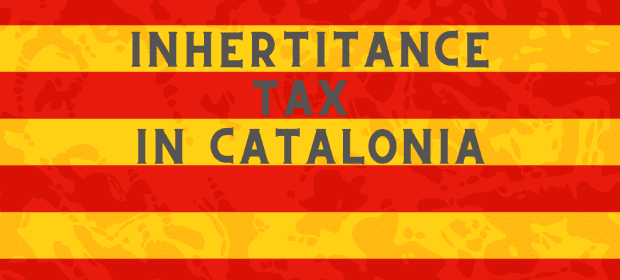
With all that has been happening the last couple of years with Brexit and the Covid 19 pandemic, it could well have slipped by many people that significant changes have been made to the inheritance tax laws in Catalonia. This will particularly affect those who are resident here and receiving an inheritance from someone who is a non-resident of Catalonia.
Prior to 2020, spouses and descendants received large allowances in respect of tax due to be paid, starting from 99%. However, for those receiving inheritance as a descendant this has been reduced, at the worst to only a 60% reduction. This raises two main questions. Firstly, how much tax will you have to pay if you receive an inheritance, and secondly, is there an alternative way to receive this inheritance, for example as a gift rather than an inheritance, which has a different rate of tax?
It is important to understand how an inheritance is taxed in Catalonia. Major factors are the relationship between the deceased and the inheritor, what asset is being received and where the money comes from, i.e. which country. In the UK it is fairly straightforward: if someone dies as a resident in the UK and leaves you assets up to £325,000 there is usually no inheritance tax (paid by the estate) to pay due to the nil-rate band. However, anything over this amount is usually is taxed at 40%. However, in Catalonia it is not that simple (surprise surprise, I hear you say!) and alongside what is declared and what you may have to pay tax on in the UK, you must also declare and pay the relevant tax in Catalonia. Any assets you already own can also be taken into the equation of what tax is payable.
Inheritance tax in Catalonia is paid by the receiver, not the estate, and very importantly, you have 6 months to declare this inheritance. Even if you haven’t yet received the inheritance (this is from the date of decease), you must declare it within 6 months or else you will be fined the following way on the amount of tax you are liable to pay:
- 5% in the following 3 months (i.e. months 6-9 since death)
- 10% from 3 months to 6 months
- 15% from 6 months to 12 months
- 20% plus interests after 12 months
However, if you know that you need more time you can ask for an extension of an additional 6 months. This must be requested in the first 5 months following the death. In this case, the surcharges described in the above table will not be applicable and you will have an extra period of 6 months.
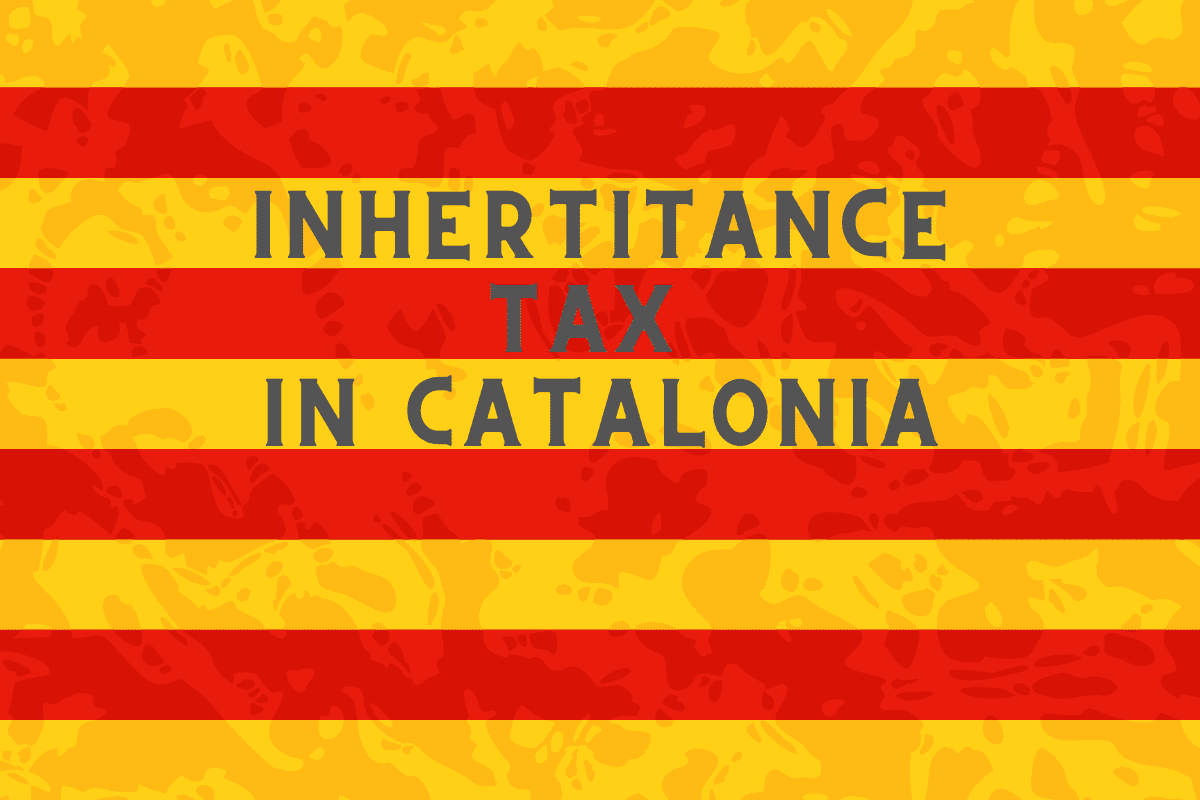
There are some discounts on inheritance tax in Catalonia. To start with, there is usually no tax to pay on the first €100,000 received if you are a spouse or child of the deceased. For other descendants, the allowance is €50,000. If you are an ascendant the allowance is €30,000 and for any other relation the reduction is €8,000.
From this point on, there are further reductions between 97-99% and other factors are to be taken into account, such as if the children are under 21, disabled, or if you receive the main home (“vivienda habitual”), family business or shares in certain types of companies.
As you can see, the calculation is not straightforward. I feel the quickest and simplest way to give you an idea of what tax you would pay is if I give examples using the most typical scenario of people we help. This scenario is of a parent resident in the UK leaving their child, who lives in Catalonia, an amount of money/assets not including property (as we said there would potentially be extra tax deductions for receiving this). The guidelines are shown below for someone tax resident in Catalonia, over 21 years old, owning assets themselves of less than €500,000. Note that the ‘domestic trousseau’ has also been included (the domestic trousseau is a tax on inherited household items, for example furniture, by default calculated as 3% the estate value):
| Amount to be inherited | Tax due in Catalonia |
| €100,000 | €84 |
| €250,000 | €6,969 |
| €500,000 | €29,888 |
| €750,000 | €64, 908 |
| €1,000,000 | €109,297 |
One possibility we investigate for our clients is whether it would it be better to plan the future inheritance and anticipate it, receiving the monies through a donation that is taxed between 5% and 9% between parents and their children (with some specific requirements). Additionally, please note that if a previous donation has been made, this must also be considered in order to calculate the effective inheritance tax rate. We always suggest getting in touch to confirm exactly what the amount would be, and for help declaring it. For the assets themselves, it is worth noting that whilst living in Catalonia it is not always efficient to have many overseas assets.
For example, investments or ISAs in the UK are declarable and tax is payable in Spain on any gain annually EVEN if you do not withdraw any of the money, unlike in the UK. It is possible to hold these monies in a Spanish tax-efficient structure, such as a Spanish Compliant Investment Bond, remaining in sterling as opposed to Euros if you prefer. In this way, you can benefit from the money growing through compounding with potential to greatly mitigate tax. This is where we can add value to help our clients effectively organise their assets, and we can manage the assets if need be.
If you have any questions relating to this article or would like help planning for this eventuality, or anything similar, don’t hesitate to get in touch.
Gift tax in Spain
By Chris Burke
This article is published on: 14th November 2021

I hope you are all well; so far so good in getting back to a ‘normal world’ but you never know how near we are to a ‘Black Swan’. This month’s TT covers the following Hot Topics:
- UK to Spanish driving license – another update
- Gift tax in Spain – assets received from a UK parent, what tax would you pay in Catalonia?
- UK private pension age to be increased from 55 -57
- UK budget – inflation forecast of 4%+
UK driving license update
Last month I mentioned that anyone with a UK driving license in Spain could use it until the end of October. The UK government has just announced this has been extended until the end of 2021, so watch this space and let us hope an agreement is reached to exchange them for Spanish driving licenses, eventually.
Gift tax from a parent in the UK?
Inheritance tax is constantly a hot topic in the UK and living abroad also, but for many people it’s not always clear as to what the rules are. In Spain for example, it’s regional on what you might pay for inheritance tax/gift tax and depends on many variables, including the amount to be received, the relationship to the donor and your country of residence.
Many people are accruing more and more assets from parents when they pass on from this life, and these assets are accruing more and more in value. However, inheritance tax is not changing that much, meaning in real terms people are paying or will be paying more money in tax. Therefore, many are choosing to try to pass their wealth on as gifts before this tax continues to escalate and plan to mitigate as much as possible.
However, for those in Catalonia inheriting/receiving a gift from a parent the tax is nowhere near as much as people might think. What is important is that you declare it, and do it on time so as not to receive any penalties.
As I stated earlier, it’s very difficult to give exact numbers as everyone’s situation is different. However, if I use a regular scenario I come across it will give you a very rough idea of what you might pay:
Potential Inheritance Tax
A British person, living in Catalonia, inheriting from a parent an amount of £250,000 would pay approximately €4,000 in tax.
Potential Gift Tax
A British person, living in Catalonia, being gifted from a parent an amount of £250,000 would pay approximately €16,500 in tax. (Note this gift amount is based on the receiver owning up to €500,000 in assets prior to the gift being received and reporting this gift to the notary.
As I say, these are approximate figures, but it will give you an idea of what you might pay.
We help clients declare this correctly and also plan what is the best thing to do with their money, including buying property, paying off mortgages, increasing its intrinsic value or protecting it against inflation.
Private/company pension access ages are to be increased
In 2015 The UK government changed pension rules so that anyone with a private pension could access the monies from age 55. This was greatly publicised, helped by an MP at the time who stated ‘If people do buy a Lamborghini but know that they’ll end up just living on the state pension, that becomes their choice’. Some people were worried people would spend all their pension money and then only have their state pension to live on. For the majority this did not happen (so far!).
Now the government has increased the age you can access your private pensions to keep in line with state pensions by 10 years, with UK state pensions claimable from age 67 for the most part. So from 6th April 2028 you must be 57 to access your private pensions.
This largely makes sense, although for many people who had started planning their retirement from age 55 it creates a problem. I have already starting helping many clients ‘plug the gap’ for this extra 2 year period which is more about changing what they are doing now to cover this eventuality in the future.
4% – inflation rising – the value of your savings decreases
In my last Top Tips I highlighted that inflation is starting to become something everyone needs to be aware of, after a decade or two of being very low. The impact it can have on your money is substantial.
The UK government in their latest budget have forecast this will go up to 4% in 2022 and maybe even higher. As I mentioned, for £100,000 you have in a bank account, in real terms this would be devaluing by £4,000 per year. CPI, the most common index that is used for measuring the ‘average basket of goods and services’ increasing or decreasing, went up by the MOST amount it ever has this last August (recorded by CPIH National Statistic 12-month inflation rate series) by almost 1% in a rolling 12-month measure.
This also brings real concerns for many people with private or corporate pension schemes, as nearly all have limits on what they will increase inflation by for your pension. This ranges from 2.5% up to 5%, therefore if inflation was to go above this your pension would not keep up with the increase in goods/services. We help clients plan and manage this potential eventuality.
What can I do with £100,000 that I might want access to in a year or two?
One of the hardest to plan for and the most common questions I receive is what to do with a set amount of money that clients might want to use in a year or two, but want it to gain an interest/keep up with inflation until then. In many cases, this ‘1 or 2 years’ very often turns into 5 or 6 years and that can be a very dangerous situation, especially taking into account inflation at 4% (that’s 20% decrease in value after 5 years).
There are a few things we highlight to clients, such as some ‘not so well known’ good interest savings accounts, using Premium Bonds and also talking through their situation to professionally plan their finances taking this into account. Over a long period of time this can make a big difference.
As ever our chosen partner for exchanging currency is ‘Smart Currency’, register here with them for free and see how much they could save you and transfer your monies safely, quickly and effectively.
Click Here to read reviews on Chris and his advice.
If you would like any more information regarding any of the above, or to talk through your situation initially and receive expert, factual based advice, don’t hesitate to get in touch.
Inheritance issues in France
By Katriona Murray-Platon
This article is published on: 11th October 2021
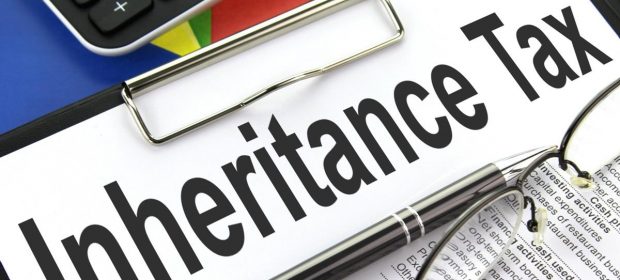
As many of you know, in 2015 the European Succession Regulation came into force. Sometimes known as ‘Brussels 1V’, this allowed you, if you deemed it suitable, to elect for the law of your nationality to apply to your Will in France. The principal benefit of this election would be to allow you to leave your property to your spouse for example, and then pass it on to your children after the second death. Another useful application would be when relationships have broken down and you have decided that one or more of your children should be excluded from benefitting from your estate. In effect, you claim the right to leave your assets to whomever you wish.
Now, in a quite frankly bizarre move, the French government has decided to move against European law. At the end of July this year a bill was passed making changes to article 913 of the Civil Code. Here is the relevant wording, with a translation ‘a la Google’.
Lorsque le défunt ou au moins l’un de ses enfants est, au moment de son décès, ressortissant d’un État membre de l’Union européenne ou y réside habituellement et que le droit étranger applicable à la succession ne permet aucun mécanisme réservé à la protection des enfants, chaque enfant ou ses héritiers ou successeurs amoureux peut bénéficier d’un prélèvement compensatoire sur les biens existants situés en France le jour de la sa mort, afin d’être rétablie dans les droits réservés qui leur sont accordés par Français loi, dans les limites de celui-ci.
Where the deceased or at least one of his children is, at the time of death, a national of a Member State of the European Union or is ordinarily resident there and where the foreign law applicable to the succession does not allow any reserved mechanism to protect children, each child or his heirs or successors may make a claim on existing property situated in France on the day of death, so as to be restored in the reserved rights granted to them by French law, within the limits thereof.

There is little scope for doubt that this directly contravenes European law. It has already been challenged once but was passed unchanged. It is likely that there will be a stream of legal challenges that could take several years to conclude. This is France after all. One silver lining is that the new decree will only come into force on the 1st November this year, and will only relate to deaths that occur after that date. For those of us who were contemplating this move, or have already employed it, this will mean that there could be years of uncertainty, and many people are not going to be able to leave their assets on death as they would wish to.
One key aspect of this change is that it can only be applied to assets situated in France which, in some cases, may affect succession plans for the principal residence and possibly French rental properties if no other planning has been put in place. There are tried and tested legal mechanisms in France for establishing property ownership that can better protect the survivor such as the ‘en tontine’ clause (only at the point of purchase), the marriage contract of ‘communauté universelle avec attribution au dernier survivant’, the ‘pacte de famille’ and the ‘donation entre époux’ to name a few. If you have any concerns about how this new change may impact your existing Wills and estate planning, I recommend that you speak to a Notaire to discuss your options.
Reflecting on estate planning
By Andrew Lawford
This article is published on: 24th August 2021

Could the oldest woman in the world have been a fraud?
Not many people will recognise the name Jeanne Calment, but she is the main character of this article and her story invites reflection, regardless of the truth of the various claims made about her.
First, let’s see who Jeanne Calment (probably) was: she was born in Arles, in the south of France, in 1875 and died in 1997 at the age of 122 years, 164 days: this happens to be the oldest age, as far as we know, of any human being ever to have lived. This is clearly remarkable – having been born at a time when the average life expectancy of a French woman was 45 years, she managed to outlive not only her own generation, but also a number of successive ones. It is worth noting that average life expectancy has been influenced greatly by the high rate of infant mortality in the past: in 1875 roughly 18% of babies in France died before their 1st birthdays – today it is less than 0.03% – so once you made it through your first year, your prospects were much better.
Of course, becoming really really old is the sort of thing that might get you into the Guinness Book of World Records, and may provoke a certain amount of interest from medical researchers concentrating on life extension, but how much else of interest can there be in the topic? Well, according to Norris McWhirter, one of the founders of the Guinness World Records (and as reported in the article linked below): “No single subject is more obscured by vanity, deceit, falsehood, and deliberate fraud than the extremes of human longevity.”

It turns out that the case of Jeanne Calment is complicated by the possibility of her not being who she said she was. The accusation of fraud is based upon the idea that she actually died in 1934, the year in which Jeanne’s daughter Yvonne is supposed to have passed away. Jeanne’s family, so it is argued, decided to declare that the daughter had died, with Yvonne then playing the role of her mother Jeanne for the rest of her life. Yvonne was born in 1898, making her death at 99 years old in 1997, if the accusation is true, somewhat less remarkable.
What could possibly have motivated the family’s decision to switch places between mother and daughter? Look no further than those two certainties of life – death and taxes – for the answer. It is clearly quite difficult to cheat death, but as the Calment family was well-to-do, saving an estimated 250,000 francs in inheritance taxes (something close to €1M in today’s money) can’t have seemed like a bad idea. If this is true, then full marks for creativity – we are certainly well beyond the bounds of your average tax evasion scheme! The story gets even better, though, with the decision of Jeanne (or Yvonne?) to sell the life estate of her apartment to her notary in 1969, at the age of 94. The agreement allowed Jeanne to remain in the property and obliged the notary to make regular payments to her until receiving full title upon her death. This sort of agreement, also reasonably common in Italy (the nuda proprietà), is essentially a bet by the buyer on how long the life tenant is going to live for. In this case, Jeanne not only outlived the notary but enjoyed continued payments from his heirs as well, ultimately receiving more than twice the value of the property she sold. Talk about a bad bet!
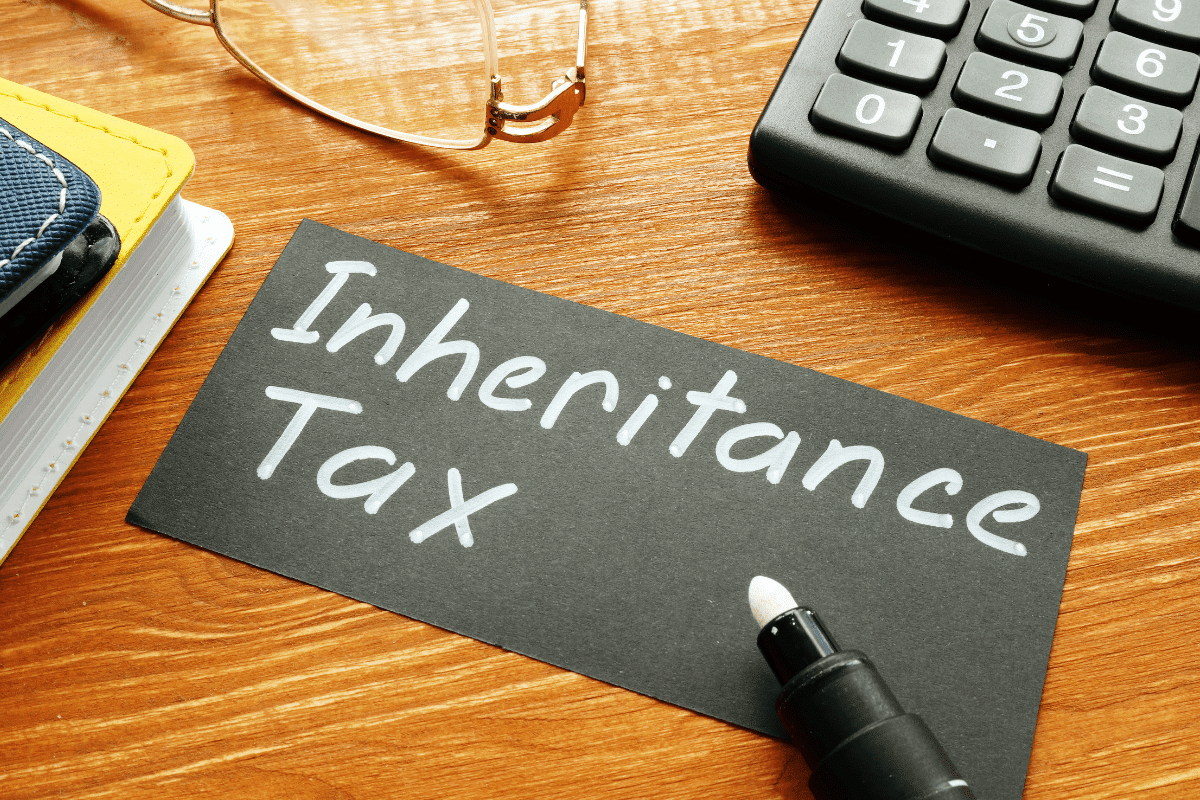
Reflecting on estate planning
What does the above have to teach us? Either that people will go to extreme lengths to save on their taxes, or that they like to dream up good stories on the topic. Certainly we should reflect on estate planning and wonder what might be coming down the line in terms of inheritance taxes in the reforms that will be forthcoming from the Draghi government over the coming months. Currently, assets passing from parent to child are taxed very lightly in Italy compared with other European countries, with a rate of 4% applied on the excess value over €1M per heir. The rates increase to a maximum of 8% with a zero threshold for an heir with no family connection to the deceased, so even in the current worst case scenario taxes are relatively low.* It is worth noting that gifts and inheritances are treated in the same way under Italian law, so it is possible to make a gift up to the threshold limit today without incurring taxes; subsequent amounts inherited would then be subject to the taxes applicable at that time, but a gift now would be made under the current rules that may well become less advantageous in the future. There are various other mechanisms available for efficient estate planning in Italy, the main one being life insurance wrappers: the amounts received by the beneficiary of a life insurance policy are not technically part of the deceased estate, as long as the policy itself is set up in the correct way.
The above constitutes a simple comment on estate planning in the Italian context, but every situation is different and I often engage with clients’ legal counsel to help make sure that the overall plan will work well in the various interested jurisdictions. If you are thinking about reviewing your estate planning in Italy or are considering moving here from abroad, it is never too early to start the discussion – feel free to send me an e-mail and we can organise a time to talk.
Where does this leave us in the case of Jeanne Calment? If you want to read the whole article, which is long but fascinating, the link is here. I won’t spoil the outcome, but I think the journalist’s ultimate conclusion is the right one. I do hope, however, that they never do the DNA testing suggested: the world is better with a bit of mystery every now and again.
* Inheritance taxes may also be due in other jurisdictions depending on the location of your assets and links to other countries.
Inheritance Planning and French Residency
By Occitanie
This article is published on: 18th May 2021
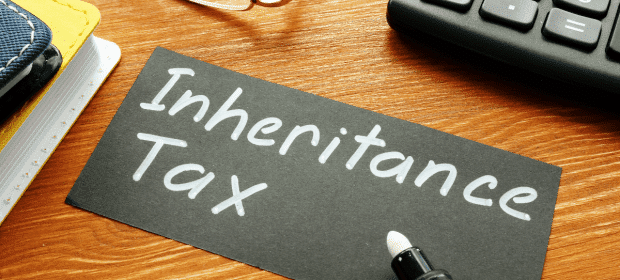
Welcome to the latest edition of our newsletter ‘Spectrum in Occitanie, Finance in Focus’, brought to you by your Occitanie team of advisers Sue Regan, Philip Oxley, Derek Winsland, together with Rob Hesketh now consulting from the UK.
As a very important part of any financial planning review, we thought we would re-visit the subject of inheritance planning in this newsletter for the benefit of newcomers and as a reminder for those of you who are already settled in this fabulously diverse and beautiful region of France.
Despite the importance of making sure one’s affairs are in order for the inevitability of one’s demise, very few actively seek advice in this area and, as a result, are unaware of the potential difficulties ahead for their families and heirs, not to mention potential tax bills which can be quite substantial for certain classes of beneficiary.
The basic rule is, if you are resident in France, you are considered also to be domiciled in France for inheritance purposes and your worldwide estate becomes taxable in France, where the tax rates depend upon the relationship to your beneficiaries.
Fortunately, there is no inheritance tax between spouses, PACSed or civil partners, and the allowance between a parent and a child is reasonably generous, currently €100,000 per child, per parent. For anything left to other beneficiaries, the allowances are considerably less. In particular, for stepchildren and non-related beneficiaries, the allowance is a measly €1,594 and the tax rate on anything above that is an eye-watering 60%!
There are strict rules on succession and children are considered to be ‘protected heirs’ and, as such, are entitled to inherit a proportion of each of their parents’ estates. For example, if you have one child, the proportion is half; two children, one-third each; and if you have three or more children, then three-quarters of your estate must be divided equally between them.
You are free to pass on the rest of your estate (the disposable part) to whoever you wish through a French will and, in the absence of making a will, if you have a surviving spouse he/she would be entitled to 25% of your estate.
You may also be considered domiciled in your ‘home’ country and if so, this could cause some confusion, since your home country may also have the right to charge succession taxes on your death. However, France has a number of Double Taxation Treaties (DTT) with other countries covering inheritance. In such a case, the DTT will set out the rules that apply (basically, which country has the right to tax what assets).
For example, the 1963 DTT between France and the UK specifies that the deceased’s total estate will be devolved and taxed in accordance with the person’s place of residence at the time of death, with the exception of any property assets that are sited in the other country. By the way, the UK–France Treaty is not affected by Brexit.
Therefore, for a UK national who is resident in France, who has retained a property in the UK (and does not own any other property outside of France), the situation would be that:
- any French property, plus his/her total financial assets, would be taxed in accordance with French law; and
- the UK property would be taxed in accordance with UK law, although in theory, the French notaire can take this asset into account when considering the fair distribution of all other assets to any protected heirs (i.e. children).
If a DTT covering inheritance does not exist between France and the other country with which the French resident person has an interest, this could result in double taxation if the ‘home’ country also has the right to tax the person’s estate.
Hence, when people become French resident, there are usually two issues:
- how to protect the survivor; and
- how to mitigate the potential French inheritance taxes for other beneficiaries
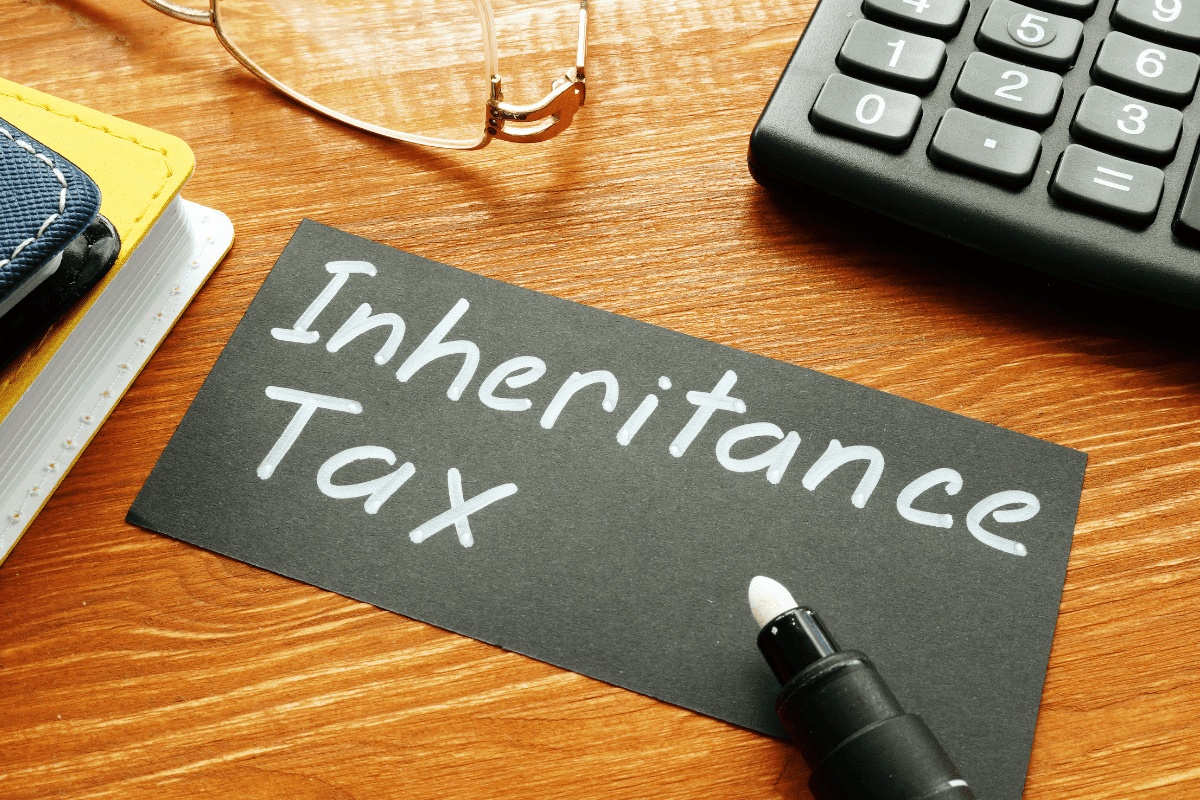
European Succession Regulation No. 650/2012
Many of you will no doubt have heard about the EU Succession Regulations that came into effect in 2015 whereby the default situation is that it is the law of your place of habitual residence that applies to your estates. However, you can elect for the inheritance law of your country of nationality to apply to your estate by specifying this in a French will. This is effectively one way of getting around the issue of protected heirs for some expats living in France.
There are a number of other ways in which you can arrange your affairs to protect the survivor, depending on your individual circumstances, such as a change to your marriage regime (yes, France matrimonial law provides for couples to select a particular type of contract under which their assets will be devolved on divorce or death) and we would always recommend that you discuss succession planning in detail with a notaire experienced in these matters.
Mitigation of Inheritance Tax
On whichever planning you decide, it is important to remember that the French inheritance tax rules will still apply. So, even though you have the freedom to decide who inherits your estate, this will not reduce the potential inheritance tax liability on your beneficiaries, which, as mentioned above, could potentially be very high for a stepchild. Hence, there may still be a need to shelter financial assets from French inheritance taxes.
By far and away the most popular vehicle in France for sheltering your hard-earned savings from inheritance tax is the assurance vie. The assurance vie is considered to be outside of your estate for tax purposes and comes with its own inheritance allowances, in addition to the standard aIllowance for other assets. If you invest in an assurance vie before the age of 70 you can name as many beneficiaires as you like, regardless of whether they are family or not, and each beneficiary can inherit up to €152,500, tax-free. The rate of tax on the next €700,000 is limited to 20% – potentially making a huge saving for distant relatives or stepchildren.
The more beneficiaries nominated (e.g. grandchildren, siblings, etc) the greater the potential inheritance tax saving, depending on the value of the policy at the time of death. Beneficiaries can be changed or added at any time during the life of the assurance vie. Remember also, that beneficiary nominations are not restricted to family members, so, whoever you nominate gets the same allowance.
The inheritance allowance on premiums paid to assurance vie after age 70 are less attractive, at €30,500 of the premium (capital investment) paid plus the growth on the capital shared between all named beneficiaries, and the remaining capital invested is taxed in accordance with the standard inheritance tax bands. Nevertheless, an assurance vie is still a worthwhile investment after the age of 70 as, in addition to the inheritance tax benefits, assurance vie offers personal tax efficiencies to the investor such as gross roll-up of income and gains whilst funds remain in the policy and an annual income tax allowance of €4,600 for an individual, or €9,200 for a couple, after 8 years.
So, in order to ensure that your inheritance wishes are carried out some planning may be required and there are investment opportunities to mitigate the inheritance tax for your chosen beneficiaries. Please contact us if you would like to discuss your particular circumstances.
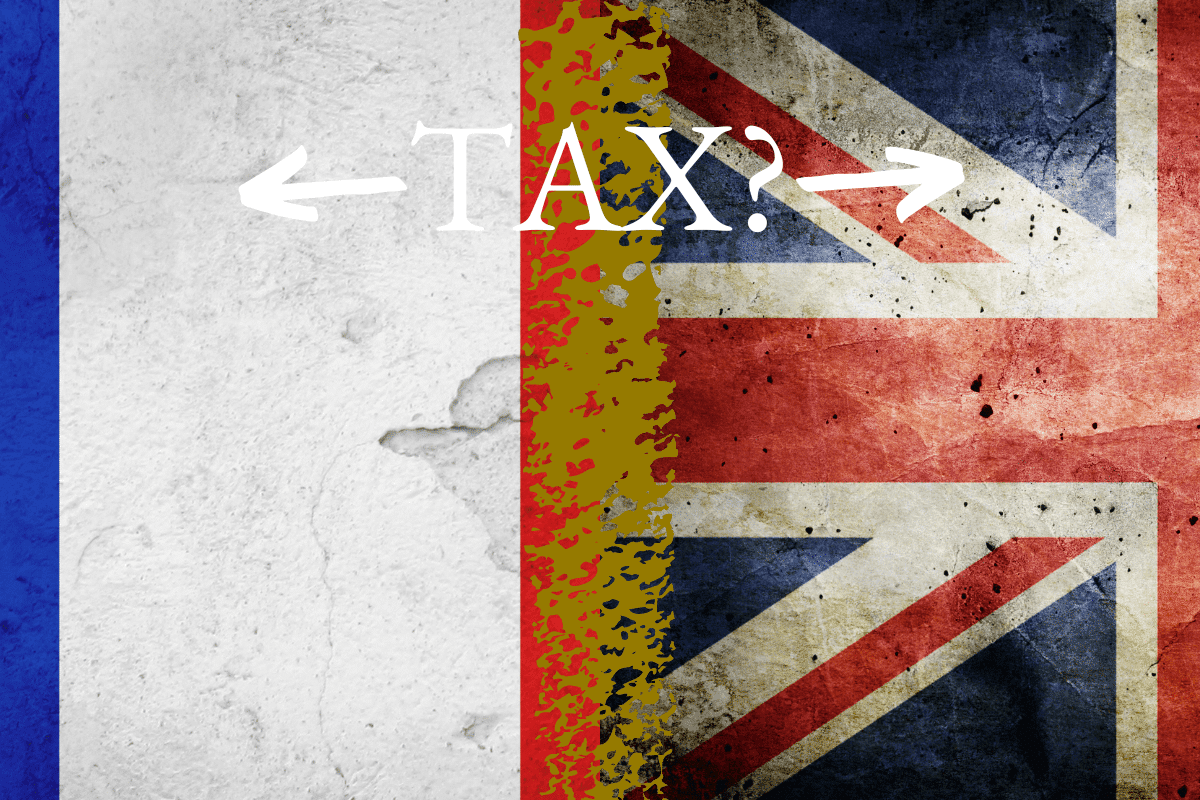
Inheriting From a Non-French Resident
The tax position of a French resident beneficiary inheriting from the estate of a non-French resident is worthy of a more detailed explanation.
The good news for UK nationals is that, due to the aforementioned DTT on inheritance between France and the UK and providing the deceased did not have any assets situated in France at the time of death, then there is no French inheritance tax payable if you are resident in France.
Where there is no specific tax treaty on inheritance in place between France and the country of residence of the deceased, then the obligation to pay French inheritance tax is determined by how long you have been fiscally domiciled in France at the time of death. You are considered domiciled fiscally in France if you are resident in France and have been for at least six years out of the last ten years preceding the death. If you fall within scope for inheritance tax then the allowance and tax rate will be in accordance with your relationship to the deceased.
If you have received an inheritance, then you may well need some advice on what to do with it and how best to shelter it from both personal taxes for you and inheritance taxes for your beneficiaries. We can help you with that.
Pension Funds and Inheritance Tax
Death benefits from bona fide pension schemes are excluded from your estate for inheritance purposes and are therefore not subject to French inheritance tax. Generally speaking, it is possible to leave your pension fund to the beneficiary of your choice, although some defined benefit (final salary) schemes will only pay death benefits to certain beneficiaries.
It is important to bear in mind that if you are considering encashing your whole pension pot under ‘Pensions Freedom’, once the funds are removed from the pension wrapper, they will be included in your estate for inheritance purposes. You could subsequently shelter these funds in an assurance vie but we strongly recommend you seek our advice before fully cashing in your pension funds as there may be any number of reasons why this would not be in your best interests.
We don’t have a crystal ball but we know how to prepare for the unknown
By Alan Watson
This article is published on: 10th November 2020

For most of 2020, nobody in France has been able to escape the misery of the daily Virus update; even as I write this article, it gets worse by the day. From a financial planner’s viewpoint, and thinking of my family, long term Rhone-Alps based, it can spin one’s head wondering, “how much, and for how long, will our children be paying extra taxes and social charges to balance this black hole.”
President Macron has certainly not been slow in pressing his Eurozone political colleagues to secure a massive support package for France (so all those excessive Urssaf charges have clearly not been enough!) Did anybody analyse, offer some statistics as to how this will be paid back? If so, sorry I missed it, but we all know the harsh reality is payback time will be long and heavy.
Many of my clients in the Alps are either retired, considering it, or working hard in their business to secure a tidy financial future, not only for themselves, but for their families also. It’s a part of life’s pattern that many of us become beneficiaries of a family estate, and being a French fiscal resident, this brings up potential questions and complications, “what are the limits I can receive before the tax man becomes an unwelcome beneficiary?”, “my children deserve a portion of this, but the bank offers a derisory return, not even Eurozone inflation proof,”, “our young daughter dreams of studying in the US, how much will that cost?”

So how do we approach such matters ? You may be surprised and relieved to hear that the French fiscal system can be both generous and highly tax efficient when it comes to financial planning for ourselves and our families. For example, a gift of €100,000 can be made every 15 years from parents to children, free of tax and social charges, which could be used for that far off house purchase, a highly regarded study program, or even setting up a business. A lower, but still highly valuable, allowance of just over €30,000 applies for gifts between grandparents and grandchildren.
Currency is also an important consideration. French banks are always happy to offer short and long term saving vehicles. The wording of the contracts, terms, and fund choices, even for somebody who has spent over 30 years in European financial services, can be rather bewildering, plus they always insist on converting your Sterling to Euros, and currently this is not a sensible proposition. In the last year alone we have seen swings between the two currencies of 10%; the Pound is still a global currency and will return to its former glory, so a far better facility is to be able to choose your exchange date, then take advantage whenthe currency is stronger to move to your new Euro based need. This flexibility coupled to tax efficiency, could make a gift for your loved ones a very sensible and well planned move.
As a financial adviser, I meet many people in sometimes complex and misunderstood situations, “I have actually lived in France for the last two years, is it now time to declare fiscal residency?”, “My children have UK ISAs set up by their grandparents, so living here as a family, is this tax efficient?”
A no obligation meeting may help to unravel the complex French reporting system, and allow you to enjoy all the things that brought us here in the first place.
The folder…
By Chris Webb
This article is published on: 10th August 2020
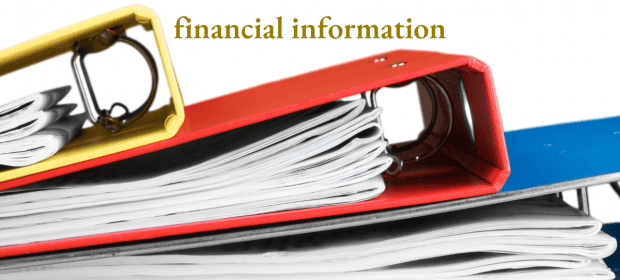
I´ve been playing around with this article during the past few days, trying to fill in some spare time during the weeks of this long hot summer we have here in Spain. I realised quite quickly that writing things that will be of genuine interest could be quite hard so for this article I´ve decided to share with you what I personally am doing at home right now.
Considering some limitations of movement right now it would be a great time to give this some thought.
One piece of advice I always give to my clients is to prepare “THE FOLDER”. You´re immediately wondering what I´m going on about, let me enlighten you to what it is and why you should do it.
For me personally I am reviewing my folder and checking its updated. Interestingly I needed to refer to my folder yesterday and realised I still had some older information on there which isn’t relevant anymore, so tonight’s job is to review and update.
There are many scenarios where you´ll be thankful for making the folder. When I moved house two years ago I went straight to the folder and had all of the companies contact information as well as policies or account details which made informing them all much easier, on the flip side I´ve also lost a family member where finding their folder reduced the stress in dealing with their estate.
In moments of stress you find yourself trawling through endless pieces of paperwork to ascertain assets and account details, then you get that lightbulb moment…….. why wasn’t it all documented.
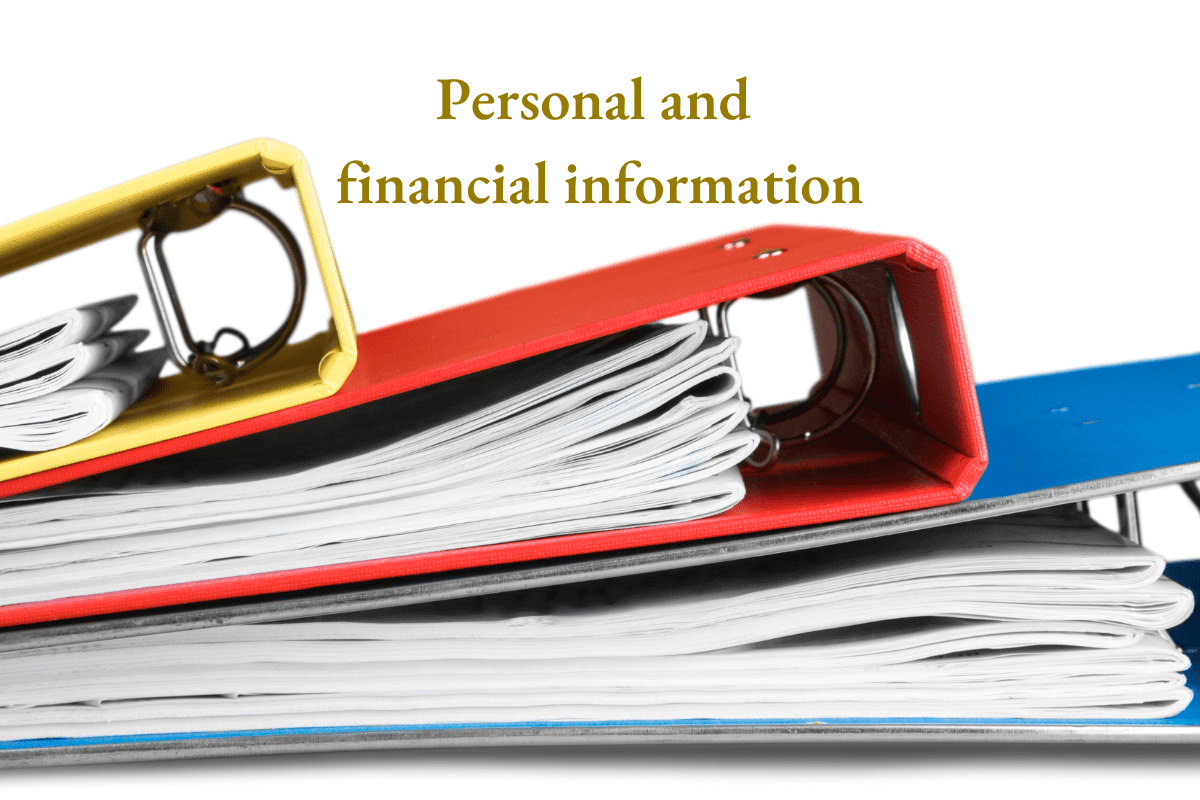
What is THE folder?
It is a single file (digital or physical) where you keep all your important personal and financial information together. It allows easy access to these documents if you’re no longer around to help. It is even more important to have it in place where one family member takes the lead on the family finances. That includes paying bills, managing accounts and storing documents.
As a family we decided to do both a physical folder and a digital folder. The digital folder is password protected, both me and the wife have access to this, and we have shared the password with close friends should anything happen to us. In the digital folder we have shared as much information as possible for all our assets.
For the physical folder it is vital to only list information that would not create a problem should that folder end up in the wrong hands. So, we have only listed the names, telephone numbers, policy / account numbers of all our assets in this folder. It would give enough information for someone to be able to deal with our affairs with minimum hassle.
Is it worth the effort?
Well, I think it is worth the effort. A time of loss can be stressful enough without having to try and piece together the deceased’s financial affairs. This can be a really difficult time for family members.
However, preparing THE folder is much more than avoiding stress; if you leave behind an administrative nightmare you could delay access to inheritors’ access to funds and potentially cost a small fortune in legal fees.
To give you an example of this, the UK Department of Work and Pensions estimate that there is currently more than £400 million sitting in unclaimed pensions pots in the UK. Imagine trying to find out if you have one.
Which is best physical or digital?
As I mentioned, we have done both and I believe most people would do the same. Some people still love to have information in physical form, something you can get your hands on. The younger generation tend to rely solely on digital devices. I don’t think it matters which way you do it, as long as you do it.
What goes in the folder?
Its essential to list what assets you have, where they are and important contact information for each asset. Keep copies of any insurance policy documents, pension statements etc. I have put a small list below which would help most of you, but you do need to look at all your assets individually to make sure the list is right!
- Life insurance policy documents
- Personal pension documents
- Employer pension details
- Details of any entitlement to state pensions
- List of bank accounts with account numbers, login details, passwords etc
- Details of any credit cards
- Property, land and cemetery deeds
- Proof of loans made
- Vehicle ownership documents
- Stock certificates, brokerage accounts, investment platform details, online investment account details
- Details of holdings of premium bonds, government bonds, investment bonds
- Partnership and corporate operating/ownership agreements (including offshore companies)
How often should ‘THE’ folder be reviewed?
I would recommend reviewing the folder on an annual basis, but if you’re extra diligent with it you should review and update every time something changes. For example, if you change insurance companies then add the new details and delete the old. This is a continuous job, its not something you do once and never look at again.
Finally…
Tell someone about your folder. Someone needs to know you have made one and whether it´s digital or physical. There is very little point going to all this effort if know body knows it exists.
Now I´m off to review my own folder, and it needs reviewing. I noticed yesterday that whilst my financial assets are up to date, I haven’t updated our vehicle details and a few other things which had gone unnoticed. Lets do this!
If you have any questions about creating your own folder feel free to reach out!


